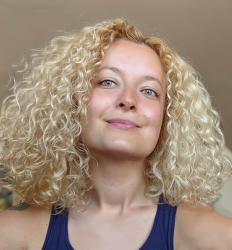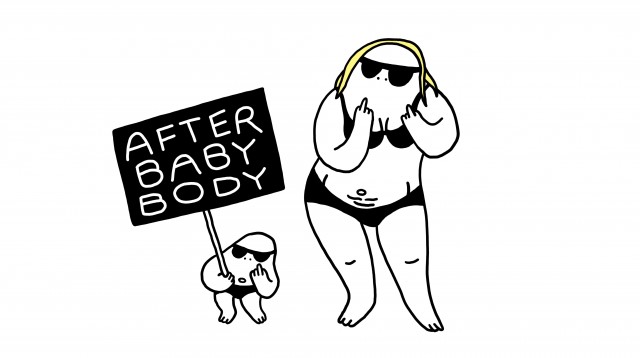As a voluntarily childless woman in her mid-thirties, I feel like I’m drowning in a sea of bulging bellies and screaming babies bobbing around me and taunting my decision not to procreate. Attached to the bellies and babies are stories about kicks and heartbeats, scans and C-sections, midwives and breastmilk, pacifiers and placentas. Otherworldly stories that I smile and nod through whilst trying to convert weeks into months in my head and struggling to accept the fact that my friend has a tiny penis growing inside her. Yet despite my cynical disposition there is a part of me that wonders ‘what if?’ and Wochenbett (Postpartum), directed by Henriette Rietz, offers an answer to that question with unassailable honesty.
It seems unlikely that a five-minute animation with a simple, almost childlike aesthetic, can convey more emotion than a feature-length live-action film, yet Wochenbett has somehow achieved it. But, this wistful, heartwarming examination of parenthood, inspired by Rietz’ own experience of becoming a mother, doesn’t blunt the edges of the director’s acutely perceptive storytelling. Her short is a triumph, not only because it nails the tonal and emotional complexity of the subject matter, but because it doesn’t sugarcoat the difficult challenges it comes with—a balance that both educates and resonates, broadening the film’s appeal to all audiences, whether they’re parents or not.
Wochenbett delves into the hectic life of a new mother, who truly believed that maternity leave would be just like an easy sabbatical. Full of hormones, sleep-deprived, and permanently exhausted, she tells her baby about the intense and deeply personal experience of becoming a parent. The playful 2D animation is conceived with an original touch, both conceptually and technically, bringing to life the protagonist’s words with stunning simplicity to an utterly disarming effect.
“I created this autobiographical film after giving birth to my first child” – Rietz shared with S/W – “We had so many weird, funny and sad moments during the first days and weeks with our newborn, that it was almost mandatory to me to make a film out of it. I wanted to acknowledge the massive and maybe overwhelming change that probably every woman experiences after giving birth. The challenges that come with motherhood are so complex and our society should give much bigger props to all mums and dads in general.”
The director’s background in Illustration is evident as she marries her bold design of heavy lines and bright, solid colors with a fast-paced narration to tell this captivating vignette. The morphing scenes and characters, paired with the trippy sound design, give the animation a timeless and chaotic quality, perfectly reflecting the overwhelming weeks following childbirth as well as the physical and psychological closeness of the family unit.
Despite the harrowing truths Rietz brings to light throughout the film—the aching breasts, the chronic fatigue, the bodily fluids and paralyzing fears—there is an undeniable softness and warmth that radiates from every frame, evoking thoughts of a very special kind of love. One that I may or may not experience, but one I can certainly admire. That of a mother for her child.

 Serafima Serafimova
Serafima Serafimova
